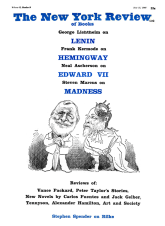In response to:
City Light from the April 30, 1964 issue
To the Editors:
Mr. DeMott’s ruminations about Norman Podhoretz’s Doings and Undoings would not be worth commenting on if they were not disguised as a review. The book seems to have inspired in Mr. DeMott some kind of provincial fantasy about New York “literary life,” with Norman Podhoretz as the accidental hero. This is why it is impossible most of the time to know what Mr. DeMott is talking about, though the clumsy prose also helps keep the meaning hidden from the reader.
In general, the piece falls below the minimum standards for reviewing. It distorts the contents of the book by meaningless quotes, by all kinds of innuendoes and mysterious references, and by an undercurrent of animus that is never really made explicit. The “review” just doesn’t begin to cope with the questions raised by Norman Podhoretz’s book, let alone reveal to the reader what they are. In fact, one wonders why it appeared in The New York Review of Books. Mr. DeMott has a right to air his discontents, but why focus them on Norman Podhoretz?
Since the next meeting of the New York Establishment to set the line on Mr. DeMott’s “review” won’t be held for another week, I’m writing this letter on my own. Though of course Mr. DeMott is bound to make the charge that I or anyone else that says this piece is absurd—am reacting as an insider, or defending a friend. I should also say—on my own—I think Doings and Undoings is an impressive achievement, though I disagree with some of it. Norman Podhoretz is one of the most gifted younger critics in this country, and whether or not one likes the book, it at least deserves a review.
William Phillips
New York City
Benjamin DeMott replies:
Mr. Epstein and Mr. Phillips both speak, at moments, as though my review of Doings and Undoings were a sermon on literary leagues and logrolling in New York City. The piece was nothing of the sort. My subject was the quality of Mr. Podhoretz’s writing, the relation between defects of his prose and a particular social climate, and the sources of his strength as a commentator on public issues; the idea of a survey of privilege and intrigue wasn’t in my mind. (That idea might have arisen, I admit, if I had known in advance how much fury my mild criticism of Mr. Podhoretz would arouse in his circle—for the fury has been of a kind that hints at bad conscience.) The comments on my illusions and fantasies are, in sum, disingenuous and irrelevant; they don’t meet the argument of the review, they misrepresent it.
Mr. Epstein’s questions, on the other hand, deserve answers. I believe a good critic should be able to state complex truths (this isn’t Mr. Podhoretz’s talent). The autobiographical items in my review of Mr. Hofstadter’s last book mentioned experiences I shared with two million other people. I put them in to strengthen a point, not to advertise my night-life. Somebody could mistake them, of course, for self-congratulation. Somebody could conclude that, as another writer boasts about having been in an argument with “Mary” (Mary McCarthy), so I boast about having been a non-commissioned infantryman. But it is hard for me to accept that anyone fully grown during the Second War could have that nutty a version of The Footsoldier’s Pride. As for the bits Mr. Epstein quotes to show that I too am a bad writer: they aren’t typos and I don’t think they’re all that bad.
Mr. Phillips’s point is that he, William Phillips, is right, therefore I am wrong. I know it’s difficult to upset a 1500-word case in 250 words, but I believe Mr. Phillips should have tried. He might at least have drawn attention to one “insight” or shrewd critical observation in Mr. Podhoretz’s book that would have testified to virtues I ignored. As it is, his letter leaves me no choice except to return to the matter of the alleged innuendoes, this time to add a reminder, viz: You cannot give or receive signals of the kind spoken of as innuendoes about “New York ‘literary life’ ” unless you know the situation from inside. And, while Mr. Phillips and Mr. Epstein are wrong on several scores, vastly condescending in the familiar New York style, and much too certain that their opinions, because theirs, need no support or justification, they are dead right about one thing. I am a rustic or provincial (no insider), and have little to tune into, when reviewing a book, except what the writer wrote.
This Issue
June 11, 1964



